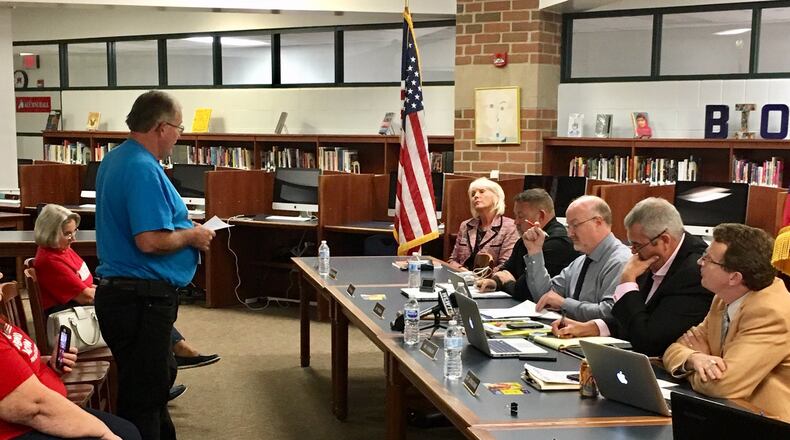Madison schools grandfather Billy Ison and his family sued the schools in February in the U.S. District Court in Cincinnati. They claim the school board violated their right to free expression and made it virtually impossible for them to speak their views about the concealed carry gun policy during school board meetings.
RELATED: Madison Schools oppose injunction over public comment policy
“The school board has engaged in a concerted campaign designed to chill and silence plaintiffs from further public criticism of its actions by imposing prior restraints on plaintiffs ability to participate in public meetings and by fabricating requirements as barriers to public participation that do not appear in the school board’s written rules,” the lawsuit reads.
They asked District Court Judge Michael R. Barrett to issue a temporary restraining order and preliminary injunction to stop the district from requiring in-person registration and enforcing a policy section that says the presiding officer may “interrupt, warn or terminate a participant’s statement when the statement is too lengthy, personally directed, abusive, off-topic, antagonistic, obscene or irrelevant.”
The school district responded that it is well within its rights to place restrictions on public comments at meetings to maintain order and ensure efficient, productive school board meetings.
The brief claimed the district’s policy “imposes the exact same regulations” as seven other nearby school districts, including Hamilton City Schools. Hamilton’s school policy states people only need to submit a written request if they need the board to take action.
Barrett agreed the district has the right to impose restrictions and even silence people.
“The policy is not based on the subject matter of the speech, but has everything to do with conducting orderly, productive meetings,” Barrett wrote.
He also said the in-person registration rule isn’t too restrictive, because the “test is not convenience” and as long as the regulation is content-neutral, it is allowable.
“Here, even if a citizen is not able to personally deliver the Public Participation Form, any community member has the ability to individually contact the board of the district’s superintendent,” he wrote. “Therefore, the court concludes that the policy’s in-person registration requirement is narrowly tailored to promote the substantial interests of the board and leaves open ample alternatives”
He noted the Isons have had ample opportunities to be heard themselves.
“The record shows that plaintiffs have spoken out against the Board’s decision to authorize staff to carry a concealed weapon more than thirty-five times at various meetings, including an open forum on July 13, 2018,” Barrett wrote. “Any community member has the ability to individually contact the Board or the district’s superintendent. The court finds based on this evidence the policy allows ample alternative channels of communication.”
He wrote that the Isons are “not likely to succeed on the merits” of any of their claims that they will suffer irreparable injury, there will be substantial harm to others or that it is in the public interest to grant the injunction.
The judge has not yet officially closed the case. The attorneys on both sides would not talk about what happens next, but one of the district’s attorneys sent this comment.
“The Madison Board of Education is pleased by the Court’s order denying the request for a temporary restraining order and preliminary injunction,” wrote Alex Ewing, counsel for the district. “The Court’s order reflects the fact that the plaintiffs are not likely to succeed on the merits of their claims. The Board has acted lawfully at all times, and believes it will ultimately prevail.”
The Common Pleas Court challenge came in response to the gun policy that was passed a year ago after a 2016 shooting at Madison Jr./Sr. High School, where a student injured four of his classmates.
RELATED: Judge rules teachers don’t need police-level training to carry guns in Madison schools
A group of parents sued the district last September, seeking an injunction blocking the district from arming teachers and other staff without the training required of law enforcement officials — 728 hours versus the 26 hours the school has in its policy — and a court order requiring disclosure of policies and procedures for arming staff.
Pater ruled in February school personnel do not need to be trained as peace officers. The parents appealed to the 12th District Court of Appeals in March.
“Friend of the court” briefs have recently been filed by Experts in School Safety and Firearms Training and one by Professor Peter M. Shane for the parents. Ohio Attorney General Dave Yost and the Buckeye Firearms Foundation supporting the school district. An oral argument in front of the three appeals court judges has been requested.
About the Author
